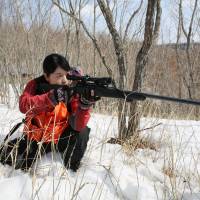Mayumi Ueno works to mitigate the huge crop damage caused in Hokkaido by its estimated 640,000 indigenous Ezo deer, using an unusual tool for Japanese women — a hunting rifle.
The 36-year-old Ueno, chief researcher in the Environmental and Geological Research Department for the Hokkaido Research Organization, got a hunting rifle license eight years ago while she was studying the diet of deer as a graduate student at Hokkaido University. Ueno needed to examine the animals' stomach contents for her research.
Learning how to use a rifle was tough. Ueno initially struggled as the scope would jerk back and hit her in the forehead when she pulled the trigger. She said she only began to enjoy hunting three years ago after buying a new rifle with a weaker recoil.
This season she went out hunting 11 times and shot six deer. Ueno said she feels excited whenever she bags one, but she immediately thanks nature for its gift.
"Whenever a deer escapes my aim, I recognize the greatness of wild nature and feel how small I am," she said.
After a kill, Ueno spends several hours carving up the animal. As the meat weighs 30 kg, she relies on her partner to help carry it to their vehicle.
Although an increasing number of restaurants are serving deer meat as a healthy meal for women — it's low in fat and rich in iron — the meager distribution network means it is rarely available to households.
Born in Osaka in 1977, Ueno became interested in wild animals when, as a member of her high school's wildlife study club, she heard a breeder at a local zoo explain that although hawks are stronger than pigeons, they are still subject to natural selection because they fight among each other.
After graduating, she attended the school of veterinary science at Osaka Prefecture University.
Ueno relocated to Hokkaido upon finishing her undergraduate studies because she wanted to address what she describes as the "problem of friction between humans and wild animals" against the backdrop of a steep increase in damage to agricultural crops by Ezo deer.
According to Ueno, reducing their numbers is indispensable to limit the damage, which came to an estimated ¥6.4 billion in fiscal 2011.
Last winter, Ueno helped draft a new hunting plan for the Hokkaido Research Organization, an independent entity established by the Hokkaido Prefectural Government. As part of this process, she spent two weeks in the wild to come up with more effective strategies.
Her husband, 35, is involved in a similar field at Rakuno Gakuen University, near Sapporo. He researches the relationship between Ezo deer and Hokkaido's forests.
The two tied the knot last August.
"We want a baby, but we have work" to do, Ueno said. "Although time doesn't wait for us, I'm really happy with my work. I want to become a full-fledged researcher and hunter as soon as possible."




